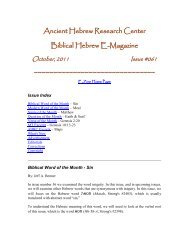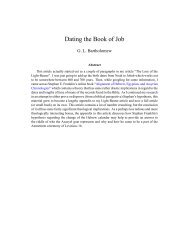My Name Forever - Ancient Hebrew Research Center
My Name Forever - Ancient Hebrew Research Center
My Name Forever - Ancient Hebrew Research Center
You also want an ePaper? Increase the reach of your titles
YUMPU automatically turns print PDFs into web optimized ePapers that Google loves.
<strong>My</strong> <strong>Name</strong> <strong>Forever</strong> 4<br />
Eh’yeh vh vt<br />
10. Let’s start with the basics. When the Almighty first revealed his <strong>Name</strong> to Moshe in Exodus 3:14<br />
he explained it as signifying, "I Am." This is extremely important as the meaning of the <strong>Name</strong>, “vuvh,”<br />
will eventually lead us to its true pronunciation. Meaning and pronunciation are inseparable.<br />
Exodus 3:14-15 And Elohim said to Moshe, “I Am That I Am.” And he said, “Thus<br />
shall you say to the sons of Yisra’el: I AM has sent me to you.” And Elohim said<br />
moreover to Moses, “Thus shall you say to the sons of Yisra’el: vuvh the Elohim of your<br />
fathers, the Elohim of Avraham, the Elohim of Yitzchak, and the Elohim of Ya’akov, has<br />
sent me to you. This is my <strong>Name</strong> forever, and this is my Mention to all generations.<br />
11. “I Am That I Am” translates the phrase eh’yeh asher eh’yeh vh v t r Jt vh v t. Eh’yeh vh v t is a<br />
verb of the Pa’al, or Kal, conjugation. We’ll discuss the seven conjugations in more detail later. For now<br />
it is enough to know that this conjugation is the simplest and conveys action in its simplest or most basic<br />
form. 12 The root of this verb is Hei Yud Hei /v/h/v (vh v) and has a basic meaning of, “TO BE, TO<br />
EXIST.” 13 The Aleph t at the beginning of the three letter root signifies the imperfect or future tense, first<br />
person singular - “I will...” The meaning of the root Hei Yud Hei /v/h/v (to be) taken together with the<br />
Aleph t modifier at the beginning (I will) signifies, “I will be,” or, “I am.”<br />
12. Immediately after saying, “Eh’yeh vh v t has sent me to you,” the Creator says, “vuvh... has sent<br />
me to you.” This would seem to indicate that vuvh, like eh’yeh vh v t, is a verb. We should expect it to<br />
also be of the Kal conjugation. The root of this verb is Hei Vav Hei /v/u/v 14 and has a basic meaning of,<br />
“TO BREATH... hence, to live... and in the use of the language, to be, i.q. the common word vh v.” 15 The<br />
Yud h at the beginning of the three letter root signifies the imperfect or future tense, third person singular -<br />
“He will...” The meaning of the root Hei Vav Hei /v/u/v (to be) taken together with the Yud h modifier at<br />
the beginning (He will) signifies, “He will be,” or, “He is.” Our search, then, is for how to say, “He will<br />
be,” using the root Hei Vav Hei /v/u/v.<br />
13. What can we learn of how he wants to be mentioned from Exodus 3:14? On the surface, it would<br />
appear, very little. But in actuality we have already learned a great deal. By way of inference we have<br />
learned that the <strong>Name</strong> is a verb of the Kal conjugation. And by knowing the tradition of “no mention” we<br />
can learn how the <strong>Name</strong> is not said. How? Simply by looking at the vowels the scribes put within it. In<br />
Exodus 3:14 and wherever else vuvh stands by itself in the <strong>Hebrew</strong> text it appears as Y’hvah vuvh or<br />
Y’hovah vu«vh, depending on the edition of the Tanakh. We get “Jehovah” from this. Whenever vuvh is<br />
found with Adonai hb«st (Lord) as in vuvh hb«st it appears as Y’hvih v uvh or Yehovih v u«vh. Why? Well, it<br />
has to do with the nature of the <strong>Hebrew</strong> language, how it fell into disuse, and, of course, Rabbinic<br />
tradition.<br />
12 See Table 3 at the end of this article.<br />
13 Gesenius: Lexicon, p. 221.<br />
14 Gesenius: Lexicon, p. 337.<br />
15 Gesenius: Lexicon, p. 219.






